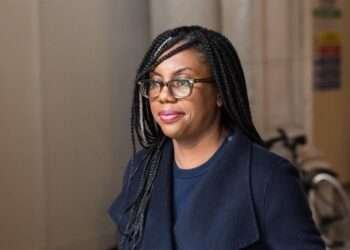Ghana’s financial landscape has seen notable developments, especially with the anticipated International Monetary Fund (IMF) inflow of $360 million.
Financial Economist Professor Lord Mensah, in an extensive interview, dissected the implications of this inflow on Ghana’s economy, its short-term effects, investor confidence, and the broader fiscal outlook.
Professor Mensah began by emphasizing the positive nature of the anticipated IMF inflow, especially in the context of Ghana’s current economic challenges.
“It is good news for the economy. I mean, if you look at the economic situation, we find ourselves in, obviously, any inflows that we expect that will not stress up the economy, for which the payback is long-term, is welcomed.”
Professor Lord Mensah Financial Economist
However, he stressed the need to capitalize on this relief by implementing measures that would ensure economic stability.
“We have to take advantage of the situation and ensure that we put in measures to leverage on this short-term inflow so we can maintain the currency in the long term.”
Professor Lord Mensah Financial Economist
Short-Term Signals to the Market
The inflow is expected to send positive, albeit short-term, signals to the market.
Professor Mensah pointed out that while the IMF inflows stabilize macroeconomic indicators, the real impact depends on the government’s ability to implement structural reforms.
“Obviously, there is an expectation of an IMF inflow of about $360 million, of course not in the long term. But these are things that normally can keep countries afloat… [but we must] ensure that the measures highlighted by the IMF are followed to sustain these gains.”
Professor Lord Mensah Financial Economist
He emphasized the importance of aligning fiscal policies with these inflows to maintain market confidence and currency stability.
Investor Confidence and Economic Growth Prospects
Professor Mensah analyzed the IMF’s report on Ghana’s economic recovery, highlighting improvements in debt restructuring, inflation control, and fiscal positions.
“The lens of a typical investor in looking at the Ghanaian economy will completely be different from what the IMF is looking at the macro-level indicators… Investors will look at micro-level indicators, [such as] how funds flow within the economy and how individuals are able to go about their businesses.”
Professor Lord Mensah Financial Economist
He argued that while the IMF report projects optimism, investors will likely adopt a wait-and-see approach to gauge how macroeconomic gains translate to tangible improvements on the ground.
Election Year Risks and Economic Stability
As Ghana approaches its next election, the IMF has flagged potential risks associated with political transitions.
Professor Mensah echoed these concerns, highlighting the inherent uncertainties in Ghana’s political and economic structure.
“We live in a typical economy where we have a winner-takes-all economic and political structure. Political risk is imminent in a sense that we are likely to change government possibly, or even if there is a continuation of government, information flow across governance is quite problematic.”
Professor Lord Mensah Financial Economist
He noted that any change in government could lead to a reassessment of the true economic situation, potentially disrupting ongoing recovery efforts.
Debt Management and Fiscal Outlook

Discussing Ghana’s debt situation, Professor Mensah highlighted the need for structural reforms. He emphasized;
“We should have seen structural reforms to see more exports or possibly a reduction in importation to tame down the foreign currency. That is the only advantage we can take from the debt restructuring from the IMF inflows.”
Professor Lord Mensah Financial Economist
He criticized the lack of significant progress in leveraging the IMF program for economic reorientation and warned that currency depreciation remains a major contributor to swelling debt figures.
Turning to inflation, Professor Mensah observed its recent upward trend. He observed;
“Inflation has started building up again. The last time I saw inflation numbers we talking about 33% there about. And clearly, it’s telling you that the policy committee [is] likely to maintain or possibly increase the policy rate together with the government being on the market looking for money every now and then through treasury bills, they cannot afford to bring the policy rate down.’’
Professor Lord Mensah Financial Economist
He acknowledged the challenges this poses to businesses and individuals, as higher rates discourage borrowing and hinder economic expansion.
Recommendations for the Next Government
Looking ahead, Professor Mensah offered advice for any government that comes to power after the elections.
“The momentum we’ve gathered within the IMF program should continue. I am expecting whoever comes to negotiate with the IMF to look at some releases that can help us.”
Professor Lord Mensah Financial Economist
He also called for structural reforms to reduce reliance on government employment.
“The only means of reenergizing the economy and creating employment is to ensure that cost of funds comes down so that individuals and businesses can borrow at a lower rate and expand.”
Professor Lord Mensah Financial Economist
Professor Lord Mensah’s analysis underscores the critical role of IMF inflows in stabilizing Ghana’s economy in the short term.
However, he cautioned that long-term stability hinges on structural reforms, prudent fiscal management, and measures to mitigate election-related risks.
His insights provide a roadmap for policymakers to navigate the challenges ahead and leverage current opportunities for sustainable economic growth.



















